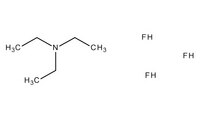814371 Sigma-Aldrich叁氫氟化三乙基胺
Triethylamine trishydrofluoride for synthesis. CAS 73602-61-6, EC Number 277-550-5, chemical formula (C₂H₅)₃N * 3 HF.
More>> Triethylamine trishydrofluoride for synthesis. CAS 73602-61-6, EC Number 277-550-5, chemical formula (C₂H₅)₃N * 3 HF. Less<<Recommended Products
Overview
| Replacement Information |
|---|
Key Spec Table
| CAS # | EC Number | Hill Formula | Chemical Formula | Molar Mass |
|---|---|---|---|---|
| 73602-61-6 | 277-550-5 | C₆H₁₅N*3FH | (C₂H₅)₃N * 3 HF | 161.21 g/mol |
Products
| Catalogue Number | Packaging | Qty/Pack | |
|---|---|---|---|
| 8.14371.0002 | 玻璃瓶 | 2 ml | |
| 8.14371.0010 | 塑膠瓶 | 10 ml |
| Description | |
|---|---|
| Catalogue Number | 814371 |
| Description | Triethylamine trishydrofluoride |
| References |
|---|
| Product Information | |
|---|---|
| CAS number | 73602-61-6 |
| EC number | 277-550-5 |
| Hill Formula | C₆H₁₅N*3FH |
| Chemical formula | (C₂H₅)₃N * 3 HF |
| Molar Mass | 161.21 g/mol |
| HS Code | 2921 19 99 |
| Structure formula Image | |
| Quality Level | MQ200 |
| Applications | |
|---|---|
| Application | Triethylamine trishydrofluoride for synthesis. CAS 73602-61-6, EC Number 277-550-5, chemical formula (C₂H₅)₃N * 3 HF. |
| Biological Information |
|---|
| Physicochemical Information | |
|---|---|
| Boiling point | 70 °C (19.9 hPa) |
| Density | 1.007 g/cm3 (20 °C) |
| Flash point | 88 °C |
| Melting Point | -27 °C |
| pH value | 3 (H₂O, 20 °C) (飽和水溶液) |
| Vapor pressure | 0.03133 hPa (25 °C) |
| Dimensions |
|---|
| Materials Information |
|---|
| Toxicological Information |
|---|
| Safety Information | |
|---|---|
| Categories of danger | very toxic, corrosive |
| Product Usage Statements |
|---|
| Storage and Shipping Information | |
|---|---|
| Storage | Store below +30°C. |
| Packaging Information |
|---|
| Supplemental Information |
|---|
| Specifications | |
|---|---|
| Assay (HClO₄) | ≥ 98.0 % |
| Colour (visual) | colourless, almost colourless |
| Density (d 20 °C/ 4 °C) | 0.995 - 1.000 |
| Identity (IR) | passes test |
| Global Trade Item Number | |
|---|---|
| Catalogue Number | GTIN |
| 8.14371.0002 | 04027269276843 |
| 8.14371.0010 | 04022536412832 |
Documentation
叁氫氟化三乙基胺 MSDS
| Title |
|---|
叁氫氟化三乙基胺 Certificates of Analysis
| Product Number | Packaging | Specification | Lot Number |
|---|---|---|---|
| 8.14371.0002 | 玻璃瓶 | PDF Specification Document | |
| 8.14371.0010 | 塑膠瓶 | PDF Specification Document |







